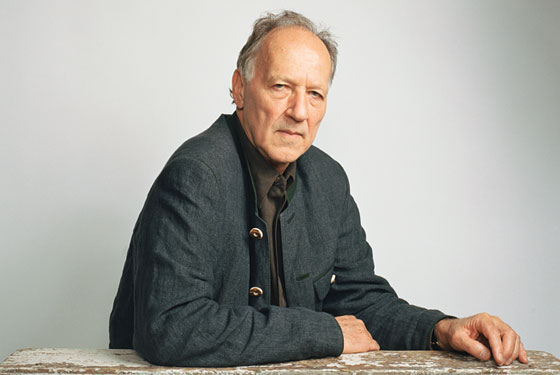
You didn’t watch many American films when you were young, did you?
I did not see any movies until I was 11. No, it was even more serious: I did not know that cinema existed. I grew up in such a remote Bavarian mountain village that we hardly had a road after the war. I made my first phone call at the age of 17.
What kind of stories did you grow up with?
Nothing. We didn’t read. My mother would tell us stories and sometimes read us stories—Winnie-the-Pooh! In German translation. Thanks to the Marshall Plan, sometimes a package came through and it was food. So I held America in very high esteem.
You must have had an active imagination, though. What did you do with it?
Well, we had no toys, so we had to invent our own games—and later, when I started to make films and we had no film industry, no people to learn from, that was useful. I made films as if I was inventing cinema.
That’s not entirely true, is it? You did have a very important mentor.
Yes, Lotte Eisner: a great film historian and a great writer. Being Jewish, she fled to France, and lived there in hiding, establishing the Cinémathèque in Paris.
And you made a pilgrimage to her sickbed.
Yes, when she was very old, like 80 or so—nobody knew exactly, she celebrated her 75th birthday four or five times—I got a call: “Come immediately, Lotte is dying.” I put the receiver down and I instantly knew that I would come on foot, 1,000 kilometers. I knew she would not die until I arrived, and I would not allow her to die. My pilgrimage was 1 million steps in rebellion against death. When I arrived, she was indeed out of the hospital.
What was the most important advice she gave you?
After ten years, and nine, ten, or eleven films, I only got hatred back and bad reviews, real bad reviews. I told her, “I can’t go on.” She took a casual bite of her cookie and a sip of her tea, and said, “No, you carry on because film history does not allow you to quit.” And in the next sentence she complains about the noisy neighbors.
Traveling has always been a huge influence on your work. Why do you think you traveled so much early on?
From age 14 on I left home and traveled on foot. I walked along the border of Albania and couldn’t get into Albania. I tried to get into the Congo at the time of the Congo crisis, with cannibalism back—complete and utter chaos. I was looking to answer a question: How does it happen that civilization can sometimes come apart, like it did with Germany with the Nazis?
One of your first films, Even Dwarfs Started Small, really pissed everyone off.
It was misunderstood by the world revolutionaries—they thought it ridiculed the revolution, but I had no intention to be political. Though my thought was, Your analysis is wrong, your remedies are wrong. The entire world has to be resolved into communist cells and communes? They spoke of the working class, but they were all rich kids from upper-middle-class families. I’d been working for three years in a steel factory. They didn’t know what they were talking about.
You love to blur the line between your life and work—
For me, sometimes life and work become indistinct. Fitzcarraldo, he pulled a 3,650-ton ship over a mountain, with 1,100 savage Indians, in the middle of the Peruvian jungle? Yes—we’ll do that too. I don’t mind that other filmmakers make movies with different means. But I’ll do it my way.
Okay, but which other artists are favorites of yours?
Visionaries that were far ahead of their times. The composer Gesualdo, in the late 1500s, composed music we heard only from Stravinsky onwards. He was 400 years ahead of his time. Hercules Seghers made prints that were so visionary and so strange he was considered some kind of insane man. Only Rembrandt took him seriously. All his art was considered wrapping paper for sandwiches. Only a hundred or so pieces survived. These are the people who touched my heart.
In your films, you’re constantly attracted to landscapes. Is there an artist whose landscapes you admire?
Turner made something like landscapes as inner landscapes—landscapes that only exist in our dreams in some way. I want to show the landscapes of our soul, an ecstasy of a landscape …
You often talk about the ecstatic truth. Who do you feel shares that sense of truth?
Writers, mostly. Bruce Chatwin, whom I knew and liked very much. At the end, he was delirious but had some clear moments. He gave me his old-fashioned rucksack from the thirties or so, and said, “You have to carry on my rucksack.” If my house is on fire, I would bring everyone who is alive, and then I would save his rucksack.
Recently you’ve been in films with Zak Penn and Harmony Korine. You mainly play comic roles. Why?
I think I have a peculiar humor that becomes a cross that I bear. I always complain that nobody sees my sense of humor, but it comes across when you have a movie theater filled with people. I’m pretty good at it, as long as I can be someone who’s vile, base, intimidating, and dysfunctional.
Rescue Dawn
July 4